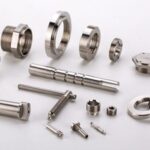Precision is one of the key phrases used in manufacturing parlance. It refers to high finesse and customization levels to achieve specific and controlled results.
Precision is achieved through high-precision components manufactured by specialized manufacturers. They are used in machines that serve multiple business domains like medical equipment, aerospace, logistics, etc.
Covering something as broad as precision components isn’t possible at a glance. Thus, this article will look at some basic aspects of precision components. It addresses users looking to get precision components manufactured.
What Exactly Are High Precision Components?
As indicated earlier, high-precision components are highly precise machinery parts customized and manufactured as per the customers’ specifications. Precision components are manufactured using various materials like Aluminum, Copper, Bronze, Brass, Stainless Steel, specialized alloys, Titanium, etc. The use of material depends on application and its operating requirements.
Where are Precision Parts needed?
Almost every industry requires precision parts. But ultra-precision components are needed in industries and applications like medicine, dentistry, aerospace, sports, technology, fluid mechanisms, etc. Precision components play a pivotal role in an age where compact parts and high efficiency are the norms.
What is the Scale of Precision Component Engineering?
While talking about the scale of precision engineering, it is challenging to quantify the term precision. It is because the scale depends on the machine of which the component will be a part, its application and specific needs.
Although zeroing down on a particular definition isn’t possible, experts have chalked guidelines and provided helpful insights into the precision engineering practices & effects to be addressed.
Mark Sullivan provides two definitions of scale. One of which is absolute and the other is relative. Precision machine design involves,
- “Positioning and stability to very small dimensions, typically below 1 µm.”
- A ratio of the smallest change or uncertainty in the position or stability of one of a machine’s components to the overall dimension of the machine on the order of 10-6.
In the Textbook of Optomechanical Engineering, Daniel Vukobratovich defines,
A rigid structure is one where the “dead weight deflection is less than the alignment tolerance”. This concern for self-weight deflection suggests the axiom: When the effects you would normally ignore are significant, you are active in the field of precision engineering. Some of these effects include:
Self-weight deflection Differential thermal expansion storing energy in the form of strain that can be released and cause alignment errors due to shock, vibration or temperature fluctuations. In many companies, they will research these and other effects, as well as ways to eliminate, mitigate, or compensate for them through training courses and extensive articles like this one.
Precision Engineering on a Larger Scale and Economics
Although defined by experts, precision engineering principles and techniques aren’t confined to such scales. Many companies have helped their clients in industries not conventionally deemed precision manufacturing.
They’ve done it by honing tooling and fixtures used in production to enhance throughput and output. Secondly, they’ve also implemented interchangeability of design changes and spare parts in production and in the field to amplify product flexibility and serviceability, coupled with post-sales and upgrades.
Precision engineering offers solutions to problems like clamping stability from kinematic mounts to quasi-kinematic mounts to a straightforward set of three machined pads and reliefs sufficiently distanced. The solution’s appropriateness depends on the application involved.
Source Precision Components from India with K5 Consulting!
Are you a manufacturer looking to source high-quality precision components cost-effectively? K5 Consulting is the right partner to provide the range of services which go into making the outsourcing successful.
We serve as sourcing partners with extensive ground contacts and network across India’s precision component manufacturing sector.
Our assistance involves everything from searching and shortlisting the right manufacturers to monitoring production, ensuring QC, communication and complying with the project’s administrative needs. Our support extends to providing logistical support and coordinating after-sales concerns to ensure seamless handling. Click here to connect with us for precision component sourcing solutions.






